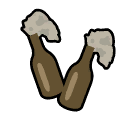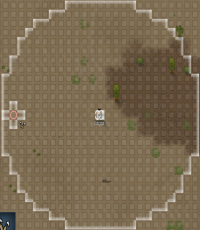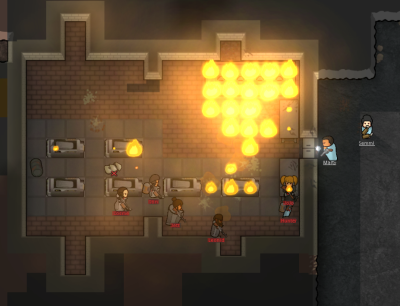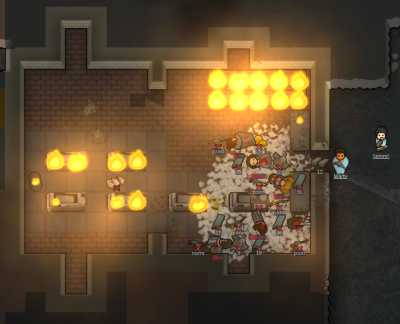Difference between revisions of "Molotov cocktails"
m (→Fire traps) |
m (→Combat) |
||
| Line 66: | Line 66: | ||
=== Combat === | === Combat === | ||
| − | Molotovs are dubious in raw combat. Molotovs are better in a supporting role, being one of the few weapons that start fires. Pawns that are on fire will stop attacking and run wildly, making them easy targets. But fire on its own isn't very strong, molotovs have a short range, and fire can lead to collateral damage. Without manual oversight, grenades are inefficient against moving targets. | + | Molotovs are dubious in raw combat. Molotovs are better in a supporting role, being one of the few weapons that start fires. Pawns that are on fire will stop attacking and run wildly, making them easy targets. But fire on its own isn't very strong, molotovs have a short range, and fire can lead to collateral damage. Without manual oversight, grenades are inefficient against moving targets. However, due to the forced miss, they can be a viable alternative weapon for pawns with low shooting skill or health issues. |
When throwing a cocktail down an 1-tile wide alley, a pawn can consistently throw a cocktail 4 tiles, not including the tile the pawn is standing on, without intersecting the two side walls. Beyond 4 tiles, there is a risk of hitting the wall and dropping short. This can be relevant to prevent friendly fire or damaging defenses during combat. Watch out when using these in place of [[frag grenades]] when melee blocking, as the fire can allow enemies to clip past your blockers, allowing them to surround the blockers or attack your backline. | When throwing a cocktail down an 1-tile wide alley, a pawn can consistently throw a cocktail 4 tiles, not including the tile the pawn is standing on, without intersecting the two side walls. Beyond 4 tiles, there is a risk of hitting the wall and dropping short. This can be relevant to prevent friendly fire or damaging defenses during combat. Watch out when using these in place of [[frag grenades]] when melee blocking, as the fire can allow enemies to clip past your blockers, allowing them to surround the blockers or attack your backline. | ||
Revision as of 08:36, 17 March 2023
Molotov cocktails
Glass bottles filled with flammable liquid, with a burning cloth in the neck. A favorite weapon for hooligans and desperate warriors from rim to rim.
Base Stats
- Tech Level
- Industrial
- Weapon Class
- Modern
- Mass
- 1.0 kg
Ranged Combat
- Mode
- Single Thrown
- Damage
- 10 dmg (Flame)
- Warm-Up
- 90 ticks (1.5 secs)
- Cooldown
- 160 ticks (2.67 secs)
- Range
- 12.9 tile(s)
- Accuracy
- -
- Velocity
- 12 (m/s)
- Burst Count
- 1 (per burst)
- Miss Radius
- 1.9 tile(s)
- Blast Radius
- 1.1
- DPS
- 2.4
Creation
- weaponTags
- GrenadeDestructive
Molotov cocktails are short ranged, thrown weapons that have a forced miss radius but deal flame damage and set a 3x3 "plus-shaped" (+) area on fire where they land. They are not consumed on use and do not use any ammo.
Acquisition
Molotov cocktails can be crafted at a Machining table once the Machining research project has been completed. They require ![]() 25 Cloth,
25 Cloth, ![]() 80 Chemfuel and 6,000 ticks (1.67 mins) of work.
80 Chemfuel and 6,000 ticks (1.67 mins) of work.
They can also be purchased from orbital pirate merchants and orbital combat suppliers, outlander faction bases, or obtained from the following raider kinds:
| Raider Kind | Chance | Average Quality | Health |
|---|---|---|---|
| Grenadier | 50% | Normal | 70-230% |
Summary
Weapon
Molotov cocktails are weapons. They take up the weapon slot and will not run out of ammo. They are blocked by walls, but the blast ignores cover. When choosing a target, a circular zone will generate to indicate range, then another 3x3 indicator with a circular center will become the aiming spot.
Molotovs deal 10 Flame damage in a 1.1 tile radius. They are thrown from a very short range of 12.9 tiles and have moderate aiming time; they explode immediately on landing. With a forced miss radius of 1.9 tiles, an unobstructed molotov always lands within 1 grid tile (including diagonals) of the target. This means Shooting skill, shooting accuracy, and health of the grenadier is irrelevant. Aiming time effects still apply, however.
Flame damage will possibly ignite pawns. The impact will create chemfuel puddles, which will then ignite and burn, causing general fires.[Puddle behavior?] Pawns on fire will run wildly and are unable to attack.
Pyromaniac pawns equipped with molotov cocktails will have a +5 Pyromaniac has incendiary weapon mood buff.
Item
When damaged with Flame damage[How much?], they may explode. The cocktails will spark and emit a hissing sound shortly before exploding some time later. The explosion deals 10 Flame damage in a 2.66 tile radius around itself.[Chemfuel puddles?] They cannot be smelted in an electric smelter.
Molotov cocktails have no quality - every set of molotovs will have the same stats, regardless of the skill of the crafter.
Analysis
| This section is a stub. You can help RimWorld Wiki by expanding it. Reason: More detail about ovens / other fire traps. |
Combat
Molotovs are dubious in raw combat. Molotovs are better in a supporting role, being one of the few weapons that start fires. Pawns that are on fire will stop attacking and run wildly, making them easy targets. But fire on its own isn't very strong, molotovs have a short range, and fire can lead to collateral damage. Without manual oversight, grenades are inefficient against moving targets. However, due to the forced miss, they can be a viable alternative weapon for pawns with low shooting skill or health issues.
When throwing a cocktail down an 1-tile wide alley, a pawn can consistently throw a cocktail 4 tiles, not including the tile the pawn is standing on, without intersecting the two side walls. Beyond 4 tiles, there is a risk of hitting the wall and dropping short. This can be relevant to prevent friendly fire or damaging defenses during combat. Watch out when using these in place of frag grenades when melee blocking, as the fire can allow enemies to clip past your blockers, allowing them to surround the blockers or attack your backline.
Because it relies on fires, rain significantly diminishes its outdoor utility. Note that the game has a "firewatcher", and will automatically start rain if fires get too out of control.
Fire traps
Molotovs become much more useful as a general firestarter. Burning down flammable structures is a very powerful tactic, though it can be costly.
Place fuel like wooden barricades or straw matting where you want things to burn. Then, lure and trap raiders (or other enemies) inside.
- In a mountain, you can use fire to burn any infestations that spawn inside your pawn's bedrooms.
- You can use wooden columns/walls as fuel, and use them to support roofs. In the absence of other support, burning the wall will cause a Roof Collapse.
In a dedicated "oven" or "burn tunnel", fire can kill infinitely many human pawns. So long as a place is roofed and "Indoors", temperatures will rapidly rise. As heatstroke is the way most pawns are downed, no amount of heat protection will save an organic pawn. Note that mechanoids are completely immune to both fire and heatstroke. Heatstroke ignores the usual death on downed chance with combat, allowing you to easily capture pawns and recover untainted armor.
Fire being used to handle an ancient shrine's cryptosleep caskets, once the initial threats are cleared.
Place some fuel, toss molotovs from outside until the room reaches ~ 400 °C (752 °F), then shoot the caskets to open them.Even with firefoam pop packs: it isn't the fire that kills, its the heatstroke (usually).
Deconstructing 1 wall will make the room "Outside", turning it from 800°C to 23°C. This allows you to easily capture pawns, untainted armor, and the rest of their gear.
Utility
Fire is very useful to dispose of flammable items, like corpses. Simply gather all unwanted items in a fireproof room (like using stone for walls and floor), draft a pawn, and throw the cocktail. Make sure to remove the Home Area around the room, so that pawns don't try and extinguish the fire. Molotovs throw faster and are significantly cheaper to produce than incendiary launchers, so are better for this purpose. For corpses, watch out for rot stink; haul corpses quickly and wait for the rot to wear before burning.
In extremely cold temperatures, fire can be a last resort in order to create heat. Use with extreme caution - fire can quickly go out of control, and temperatures easily get too hot. Typically, colonies with access to molotovs also have access to heaters.
Version history
- 1.0 - Received a crafting recipe.



